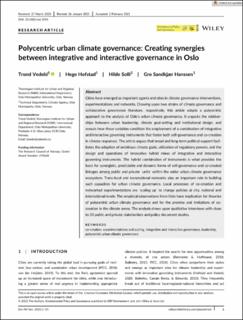| dc.contributor.author | Vedeld, Trond | |
| dc.contributor.author | Hofstad, Hege | |
| dc.contributor.author | Hilde, Solli | |
| dc.contributor.author | Gro Sandkjær, Hanssen | |
| dc.coverage.spatial | Norway, Oslo | en_US |
| dc.date.accessioned | 2021-06-01T10:55:59Z | |
| dc.date.available | 2021-06-01T10:55:59Z | |
| dc.date.created | 2021-03-09T11:16:39Z | |
| dc.date.issued | 2021-03-08 | |
| dc.identifier.citation | Environmental Policy and Governance. 2021, (1-14). | en_US |
| dc.identifier.issn | 1756-932X | |
| dc.identifier.uri | https://hdl.handle.net/11250/2757195 | |
| dc.description.abstract | Abstract Cities have emerged as important agents and sites in climate governance interventions, experimentations and networks. Drawing upon two strains of climate governance and collaborative governance literature, respectively, this article adopts a polycentric approach to the analysis of Oslo's urban climate governance. It unpacks the relationships between urban leadership, climate goal-setting and institutional design, and reveals how these variables condition the employment of a combination of integrative and interactive governing instruments that foster both self-governance and co-creation in climate responses. The article argues that broad and long-term political support facilitates the adoption of ambitious climate goals, utilization of regulatory powers, and the design and operations of innovative hybrid mixes of integrative and interactive governing instruments. The hybrid combination of instruments is what provides the basis for synergistic, predictable and dynamic forms of self-governance and co-created linkages among public and private ‘units’ within the wider urban climate governance ecosystem. Trans-local and transnational networks play an important role in building such capacities for urban climate governance. Local processes of co-creation and networked experimentations are ‘scaling up’ to change policies at city, national and international levels. The empirical observations from Oslo have implication for theories of polycentric urban climate governance and for the promise and limitations of cocreation in the climate arena. The analysis draws upon qualitative interviews with close to 50 public and private stakeholders and policy document studies. KEYWORDS co-creation, experimentations and scaling, integrative and interactive governance, leadership, polycentric urban climate governance | en_US |
| dc.language.iso | eng | en_US |
| dc.publisher | Wiley | en_US |
| dc.relation.ispartofseries | Environmental Policy and Governance; | |
| dc.rights | Navngivelse 4.0 Internasjonal | * |
| dc.rights.uri | http://creativecommons.org/licenses/by/4.0/deed.no | * |
| dc.subject | Co-creation | en_US |
| dc.subject | Experimentations | en_US |
| dc.subject | Scaling | en_US |
| dc.subject | Integrative governances | en_US |
| dc.subject | Interactive governances | en_US |
| dc.subject | Leadership | en_US |
| dc.subject | Polycentric urban climate governances | en_US |
| dc.title | Polycentric urban climate governance: Creating synergies between integrative and interactive governance in Oslo | en_US |
| dc.type | Peer reviewed | en_US |
| dc.type | Journal article | en_US |
| dc.description.version | publishedVersion | en_US |
| dc.rights.holder | © 2021 The Authors. | en_US |
| cristin.ispublished | true | |
| cristin.fulltext | original | |
| cristin.qualitycode | 1 | |
| dc.identifier.doi | https://doi.org/10.1002/eet.1935 | |
| dc.identifier.cristin | 1896594 | |
| dc.source.journal | Environmental Policy and Governance | en_US |
| dc.source.pagenumber | 1-14 | en_US |
| dc.relation.project | Norges forskningsråd: 255189 | en_US |
| dc.relation.project | Norges forskningsråd: 270668 | en_US |

